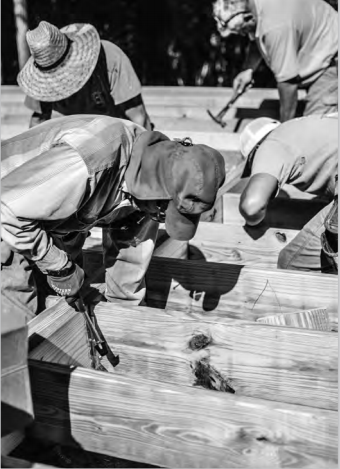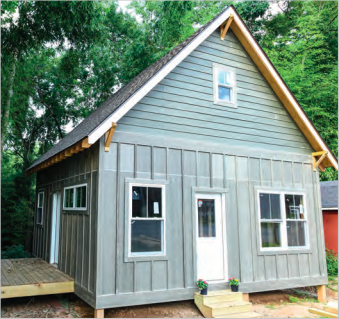After a close friend of the community froze to death in 2016 while sleeping along the banks of the French Broad River, the BeLoved Asheville team mobilized to make a dent in the housing and security crisis.
With the realization that transitional housing and existing affordable housing were failing, the BeLoved team zeroed in on a long-term solution. The nonprofit’s vision is coming to fruition this year in the construction of BeLoved Village, a community of affordable, sustainable and long-term micro homes.
The local housing problem
BeLoved Asheville is a nonprofit dedicated to helping those who live on the fringes of society. Its core mission is to empower individuals and end homelessness, poverty and racism. The board works closely with donors, people on the streets and volunteers to help those in need. The nonprofit has learned that a lack of housing can impact every other facet of a person’s life.

“A lot of people we work with have stories about their inability to find housing,” said the Rev. Amy Cantrell, co-director of BeLoved Asheville. “We dug into why that was and found the kind of housing currently offered here is unhealthy in a lot of ways. What people really want is a ‘home,’ something with dignity.”
Cantrell says much of the affordable housing offered in this region is unhealthy or transitional in nature. The options are limited, and often not very sustainable. Much of the affordable housing stock in this area can be found in overcrowded apartments, trailers located many miles from a bus stop, or older buildings that contain mold and unhealthy toxins.
Additionally, research shows Asheville rent ranks highest in North Carolina, that Asheville is the second most gentrified city in the nation, and that 62 percent of area renters are cost-burdened.
Older adults on a fixed income, individuals living on the streets, veterans, and workers employed in minimum-wage jobs are among the groups most often in need of affordable housing. From representatives of these groups, the BeLoved board garnered information about the types of housing people desire. The board learned that these individuals not only need housing that is affordable, but they also crave trees and land, a sense of community, and sustainability.
The BeLoved board took a full year to consider these needs and study the housing crisis in Western North Carolina and across the country. At that time, they created the initial concept for BeLoved Village.
In 2017, the team posted a video on Facebook, introducing their idea and asking for help. The response was immediate. A local church offered an acre of land in East Asheville. This plot is now the construction site for the envisioned micro-home village.
The sustainable housing solution
BeLoved Village’s model involves four components: deeply affordable, community oriented, sustainable and equity producing.
There will be 12 micro homes in BeLoved Village, and each is built to be accessible to people making 30 percent of the median income, or $750 to $1,000 per month.
Residents will pay one monthly rate. A percentage of this payment will be directed into an equity fund for each resident. Another percentage will be put toward a “pay-it-forward” fund supporting the next village project. The remaining amount will support ongoing maintenance and upkeep of the village.
“The people who need this type of housing are working really hard and not getting anywhere,” Cantrell said. “It was important that we put an equity component into the project. Equity helps people move forward and mitigate crises. It helps them go back to school or start a business. We truly believe this model is a transformative agent on many levels.”

Each cottage will be roughly 440 square feet with a loft above as well as a porch. The goal is to build an infrastructure that fosters a sense of community. The first home was expected to be completed in the summer of 2020.
The plan is for this village to serve as a model for future villages in the region and beyond. Cantrell says if they can show it works to aid in the housing crisis, they plan to coach other groups to replicate the model.
A Sustainability Action Plan was developed to guide decision-making as it pertains to the use of green and sustainable building materials, practices and methods.
Building supplies used in the project will be sourced through donations and recycled materials. There will be green space for residents to plant gardens and use for recreation. Further, local artists are creating pieces and Warren Wilson College pottery students are making dishes for each cottage. Volunteers and youth are painting recycled wood to be used throughout the property.
“Our goal is to create an environment where people feel a sense of pride, put down roots and get to know their neighbors,” Cantrell said. “The feeling of home goes into this very deep place inside all of us and it’s traumatic to not have one. We hope BeLoved Village offers this basic human need to its residents.”
You can also view this article as it was originally published on pages 22-23 of the 2020-2021 edition of the directory.

